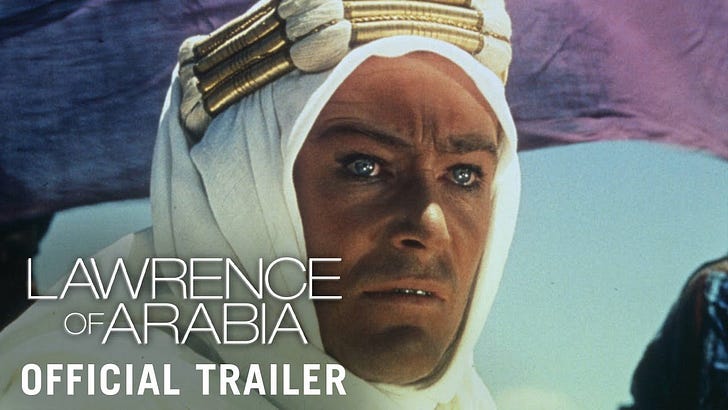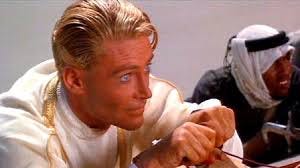Peter O’Toole’s Compelling Thespian Greatness
“Lawrence of Arabia” imprinted on my consciousness; all else he did that I saw heightened my regard
Since the Middle East has our attention….
I shy away from saying anything in entertainment is the best above all else. The popular trend of ranking the arts is almost absurd to me, as creative works and those who make them are, when you reach a certain level of greatness, best assessed qualitatively not quantitatively.
I do use “favorite” to somewhat get around talking about the music, films, TV and other arts I admire and value the most, but still qualify it most of the time. But if forced at gunpoint to name my favorite actor above all others, I’d have to say it’s Peter O’Toole. I would even argue that he was the finest actor of our modern times. A recent documentary, “PET.E.R O’TOOLE: Along the Sky Road to Aqaba,” streaming on the Britbox platform, underscores why O’Toole is my favorite, and makes a compelling case for his thespian brilliance as one of the greatest of all time.
O’Toole came into my consciousness when I saw his first major starring role in “Lawrence of Arabia” in its local premiere, one of the many across the nation, in December 1962, just before my ninth birthday. That night also celebrated the opening of a new luxury movie theater in my hometown of Binghamton, NY. Between that and the movie itself with its overture, intermission partway through its 3.5 hour run, and the sweep and scope of the story, dazzling visuals as well as, of course, O’Toole’s dynamic performance, plus the lavish souvenir program, all made it the first genuine special event of my young life, and it’s embedded deeply in my memory.
I contend, in violation of my own mission statement, that it’s the best epic film ever made (classics division). Its only serious competition is “The Bridge Over the River Kwai,” by the same director, David Lean. Some might posit “Doctor Zhivago.” Directed as well by Lean, natch…. “Lawrence” is madatory viewing for all who wish to lay claim to being a cineaste.
O’Toole’s portrayal of T.E. Lawrence in his first major film role was electric and magnetic in a way far beyond anything I’d ever seen onscreen. His portrayal so enraptured my young soul that for the next Halloween, my mother made me a fantastic recreation of the white robes and headdress O’Toole wore in the movie. It’s ironic that I would later spend time in the Mideast through a war.
The embedding is so deep that the next time I watched “Lawrence…” in 1990 on VHS, I started noticing things wrong, in contradiction to what I clearly recalled. Early in the film, Lawrence sets off across the desert with a Bedouin guide in search of Prince Faisal’s army. In the video, viewed from above atop a hill, they traveled right to left; I was sure they rode their camels left to right in the movie I saw decades before.
When I saw the magnificent restoration of “Lawrence” not long after – bingo! Left to right. When I later came across “The Lawrence of Arabia Book” about its development and making, I learned how it was also hacked down the by its US studio to shorter length. In one cut, the negative of the scenes described above was reversed; that became the master for the video. (Knowing your memory has its relaibility is gratifying). Restoration corrected that, and enhanced a glittering jewel of a film. The book is loaded with much wonderful art and includes a forward by Martin Scorsese, who has his own epic-length “Killers of the Flower Moon” opening as I write this, beckoning me to enjoy it on the big screen.
My initial O’Toole and “Lawrence” experience introduced me to cinema as great art and not just entertainment. His performance showed me what thespian greatness looked and felt like, in just one fell swoop being a veritable master class in acting at its finest and most compelling and impactful. In the early 1980s, he again vaulted another film, “The Stunt Man,” into my cinematic pantheon with his portrayal of a twisted, power-mad film director in a brilliantly written and directed movie about making movies with a fascinating backstory and a documentary about its making. Both should inform and inspire any director determined to see their vision fulfilled onscreen.
Much the same applies to seeing him around the same time in “My Favorite Year” as a drunken, desiccated swashbuckling Hollywood actor past his prime who is booked onto an early TV variety show, where one of its writers has to shepherd him through the process. It’s O’Toole at his antic, farcical finest in a role that I believe into which he injected a wee bit or more of the life experiences of the real Peter O’Toole. They’re only some of the O’Toole films I’ve seen. The last one I watched was the offbeat, sweet and touching “Venus,” which earned him his eighth best leading actor Academy Award nomination.
The fact that he never won a competitive golden Oscar statuette is a sad oversight, to put it mildly. When O’Toole was notified that he’d was going to be honored at the 2002 Oscars with an Honorary Academy Award for his lifelong body of work and his contributions to film, he tried to beg off accepting, noting that he was "still in the game" and hoped he might "win the lovely bugger outright." His kids convinced him that it was quite a high honor and he attended the ceremony and was presented with his award by Meryl Streep. O’Toole later quipped that he was "Biggest Loser of All Time" with eight Best Actor nominations and no win.
The doc has inspired me to seek out those O’Toole I’ve yet to enjoy. I only wish I’d seen him onstage.
The real meat and potatoes – or maybe I should say nourishing bangers and mash – of “Along the Sky Road to Aqaba” is the testimony of other notable and highly-talented thespians like Anthony Hopkins, Derek Jacobi, Kenneth Branagh and Brian Cox. They rate O’Toole above and beyond most all as an actor. And even though he was one to push back against the system and on occasion the dictates and tactics of directors, the actors who worked with him all attest to his consistent generosity and support given to his fellow dramatic players. He also would always show up on set or stage with the script fully etched into his memory. O’Toole’s devotion to and reverence for his craft I learned about in the doc was a moon shot that launched my esteem for this actor even further beyond the high regard I have held for him since my youth.
It was also delightful and informative to see and hear his wife and the mother of his children, Siân Phillips, a woman of such class, grace and intelligence as well as a deep reservoir of feminine insight, empathy and integrity that reminds me of my own beloved, recently-deceased Mom. Icing that cake is the revelatory comments of their daughter, actress Kate O’Toole. She’s one of my favorite Facebook friends; I was quite tickled when she sent me a friend request, given my admiration and affection for her father (Kate and I share a number of real-life friends here in Austin, TX, where she visits frequently). Her social network posts brim with the sharp wit her father was known for, and she has also inherited his acting mastery.
Not long after started write this, I planned to again see O’Toole on the big-screen as T.E. Lawrence in the beautifully-restored “Lawrence” movie in a summer film series at a classic local theater. Life intervened, alas. Though by now I know the lengthy film like the back of my hand, having seen the restoration two more times on DVD and streaming TV, it still beckons to be seen at the theater at a larger-than-life size that spotlights its visual splendor. And learning more about Peter O’Toole makes me cherish our commonalities: Scots-Irish heritage, a strong rebellious streak, a devotion to excellence in our craft, and a fondness for, at times, recreational inebriation.
In a way, my life has been an ongoing Peter O’Toole film festival. The aesthetic and emotional rewards of it are near incalculable. To borrow a phrase Winston Churchill said of Lawrence, we shall never see his like again.




